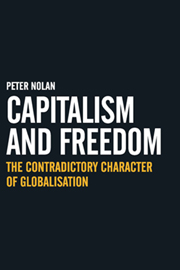Part 2 - Groping for a Way Forward: Conflict or Cooperation?
Published online by Cambridge University Press: 05 March 2012
Summary
Those who seek international conciliation may study with advantage the conditions which have made the process of conciliation between social classes in some degree successful. Essential conditions of that process were that the reality of the conflict should be frankly recognized, and not dismissed as an illusion in the minds of wicked agitators; that the easy hypothesis of a natural harmony of interests, which a modicum of goodwill and common sense would be sufficient to maintain, should be consigned to oblivion; that what was morally desirable should not be identified with what was economically advantageous; and that the economic interests should, if necessary, be sacrificed in order to resolve the conflict by the mitigation of inequalities.
(Carr, 2001: 217)Introduction
Between them, China and the Muslim world contain over 2.5 billion people, over two-fifths of the world's population. China's population is around 1.3 billion. They mostly live in a single country. China's rise is a central fact of political economy in the twenty-first century. At the start of the twenty-first century there were 1.3 billion Muslims in the world, roughly the same number as Chinese people. Unlike the Chinese, the Muslims are spread much more evenly across the world's territory. There are around 900 million in fifty-seven independent Muslim states and 400 million in over 100 communities in the rest of the world (Ahmad, 2003: 190).
Although they are dispersed across many countries, they have common beliefs that give them a united voice on some key issues.
- Type
- Chapter
- Information
- Capitalism and FreedomThe Contradictory Character of Globalisation, pp. 145 - 280Publisher: Anthem PressPrint publication year: 2007



